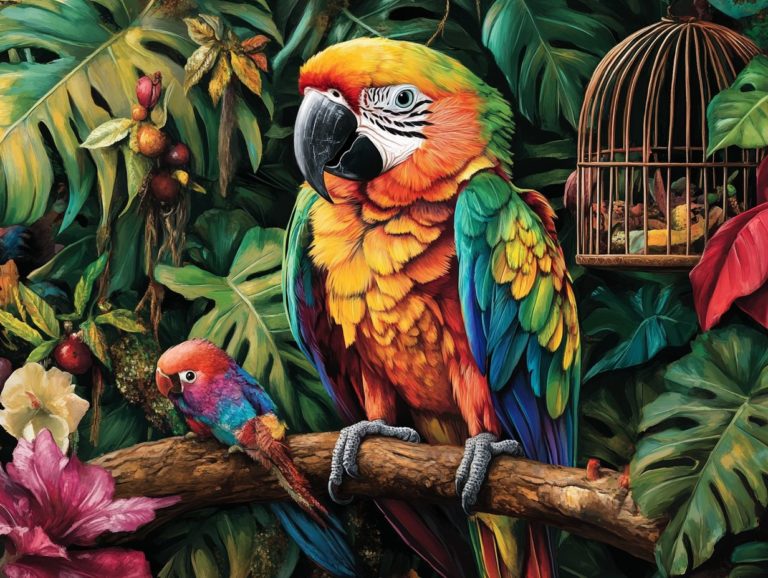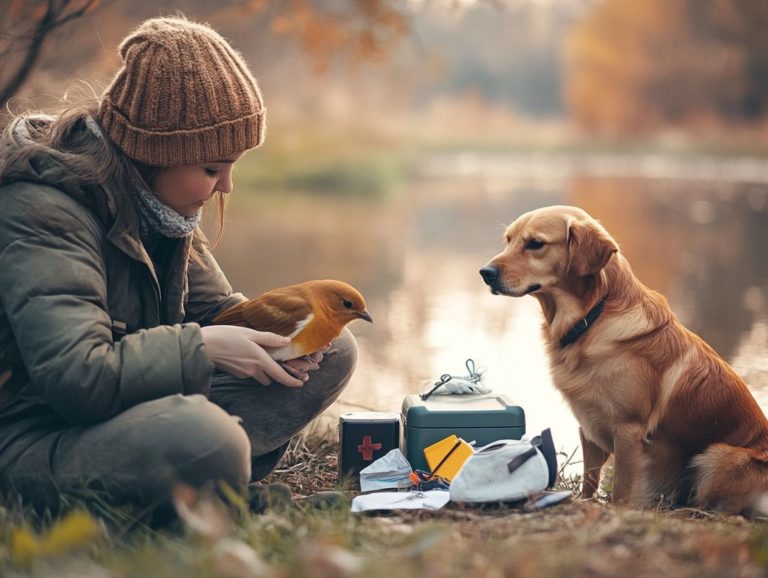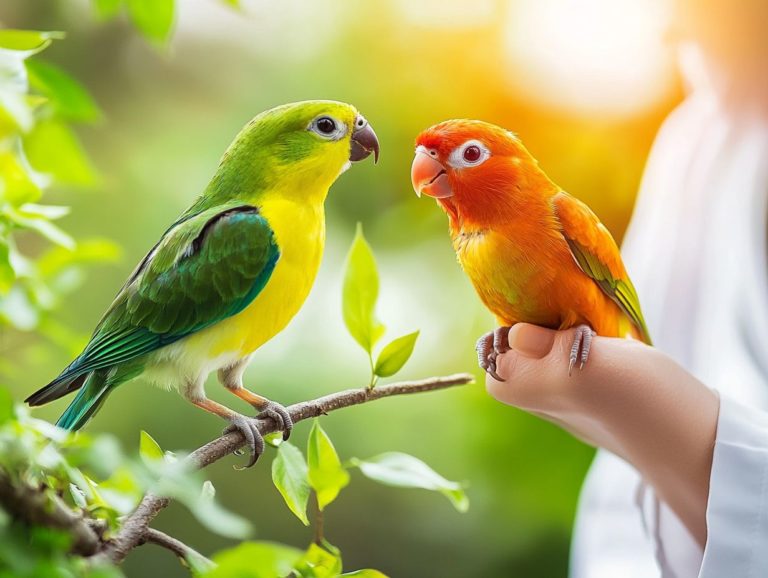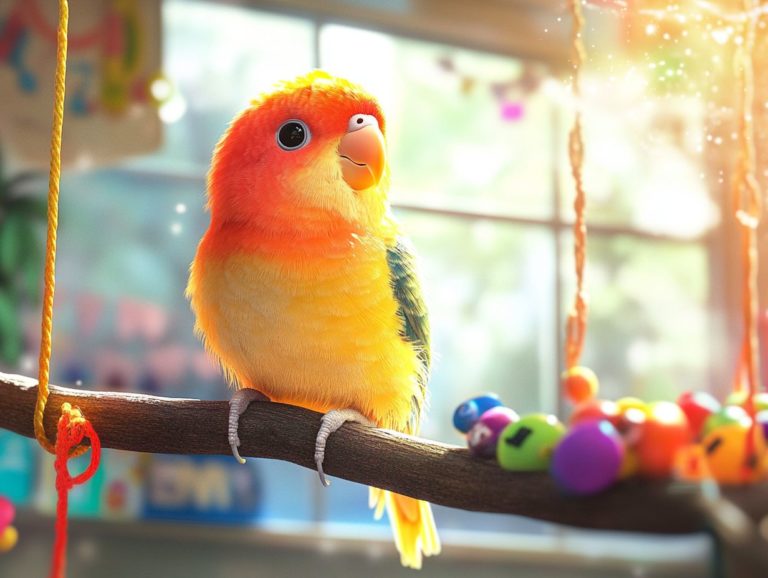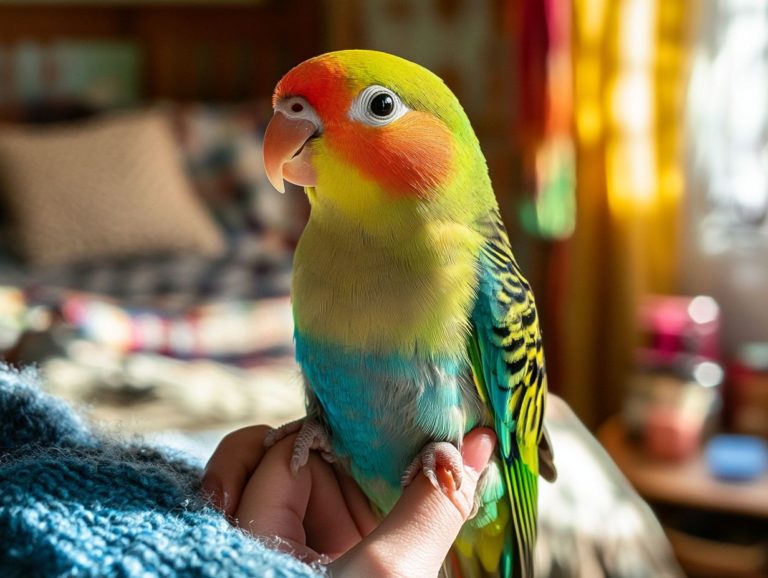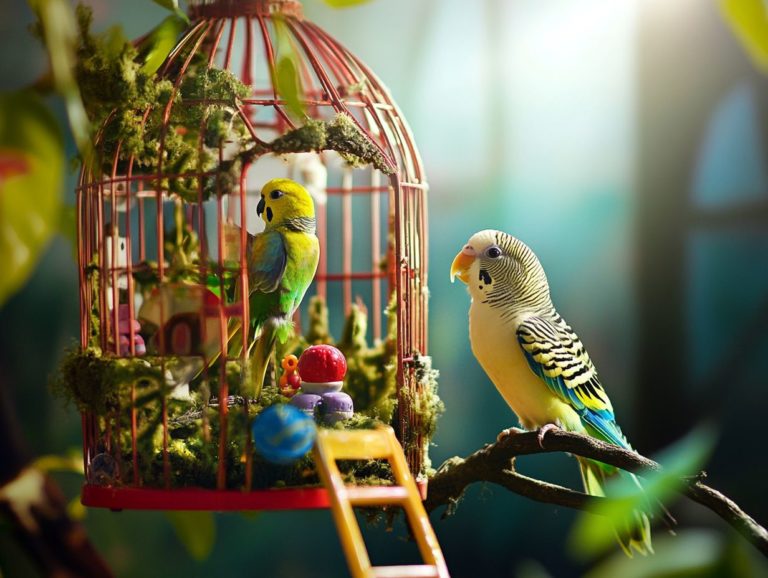Can My Bird Eat Human Food?
Understanding what your feathered friends eat is essential for their health and happiness.
From the natural diets of wild birds to the specific nutritional needs of pet birds, making the right food choices can significantly impact their overall well-being.
This guide will delve into safe human foods, spotlight harmful options to steer clear of, and offer helpful tips for incorporating these foods into your bird’s diet.
Whether you’re a seasoned bird owner or just beginning your journey in avian care, this article will arm you with the crucial knowledge needed to nurture your pet bird effectively.
Contents
Key Takeaways:
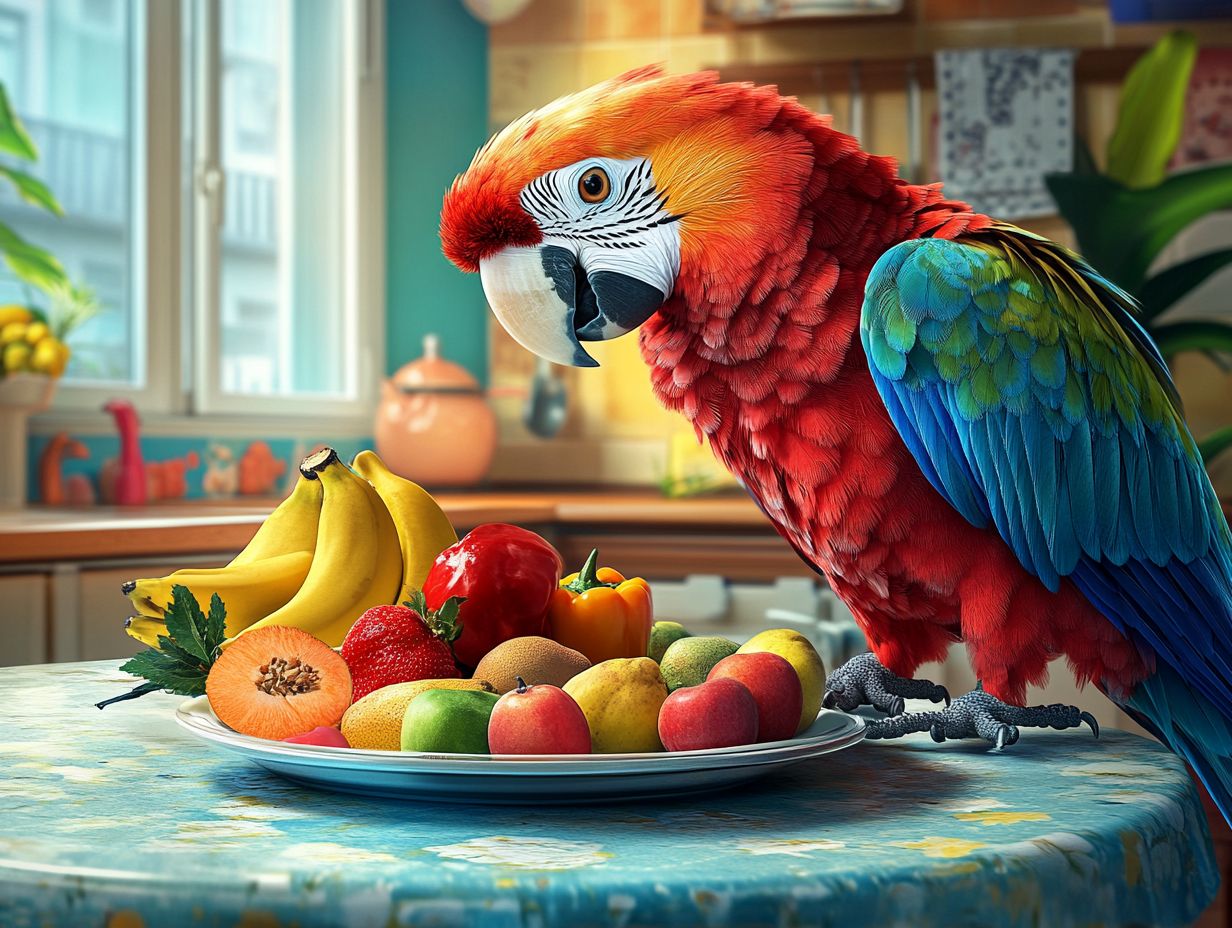
- Birds have different nutritional needs than humans, and a majority of their diet should consist of fruits, vegetables, and bird-specific food.
- Some human foods, such as fresh fruits and vegetables, can be safely incorporated into a bird’s diet as treats or supplements, but should be given in proper portions and frequency.
- There are many human foods that harm birds, such as chocolate, avocado, and caffeine, and should be avoided completely to prevent potential health issues.
Understanding a Bird’s Diet
Understanding a bird’s diet is essential for ensuring your pet’s health and well-being, especially when it comes to parrots. These intelligent creatures require a balanced intake of nutrients that closely mirrors their natural feeding habits.
A proper diet for birds should encompass a diverse array of foods, emphasizing crucial vitamins like C and K. These vitamins play a pivotal role in supporting their immune system and overall energy.
The foods you choose can have a profound impact on your bird’s health, making it imperative for you to be well-informed about the best options that foster long life and happiness in your feathered companion.
What Birds Eat in the Wild
In the wild, you ll find that parrots enjoy a diverse diet, feasting on fresh fruits, vegetables, seeds, and nuts all foraged from their natural habitats. This varied menu is not just delicious; it’s a must for their overall health and well-being.
Imagine wild parrots indulging in tropical delights like bananas, papayas, and mangoes, each bursting with vitamins and antioxidants. They also munch on leafy greens and a medley of vegetables, such as carrots and bell peppers, to fulfill their fiber and hydration needs.
The combination of seeds and nuts provides healthy fats, crucial for their energy levels. It s a testament to how the richness of their diet enables these remarkable birds to thrive in their natural environment.
Nutritional Needs of Pet Birds
Pet birds, particularly parrots, have specific nutritional needs that require your attention to detail. A carefully balanced diet consisting of pellets, seeds, and fresh produce is essential for their health and well-being.
Providing a diverse array of foods is crucial to ensuring they thrive. A diet primarily based on high-quality pellets can form the foundation, delivering essential nutrients that guarantee your feathered friends receive a well-rounded intake of proteins, vitamins, and minerals.
It’s also vital to supplement this with fresh fruits and vegetables. These not only add extra vitamins and minerals but also aid in hydration and digestion. Incorporating foods like leafy greens, carrots, and berries will enrich their diet, fostering a happier and healthier bird, ultimately enhancing their long life and energy.
Human Foods that are Safe for Birds
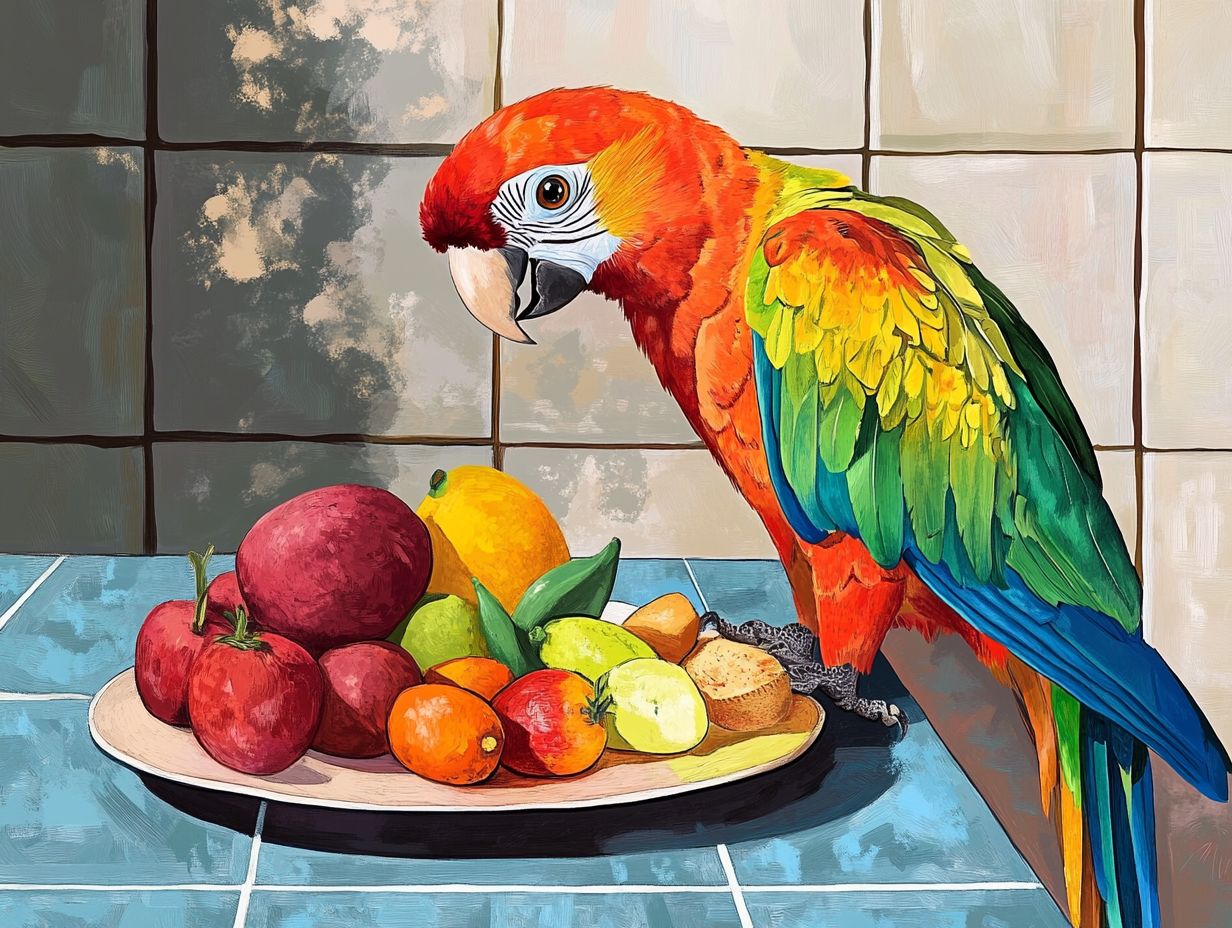
When you re feeding parrots and other pet birds, it s crucial to know which human foods are safe for them. This understanding is key to ensuring their health and happiness, as many birds can delight in a variety of nutritious kitchen scraps and fresh produce.
Discovering safe human foods opens a world of tasty treats for your feathered friend!
Healthy Options for Treats and Supplements
Imagine adding delicious treats like organic strawberries, carrots, cucumbers, nuts, and peas to your parrot’s diet each option brimming with essential vitamins and minerals.
By including these snacks, you’re satisfying your parrot’s natural foraging instincts. This also enhances their overall health and well-being. Take strawberries, for instance; they’re packed with antioxidants and vitamin C.
Carrots serve as an excellent source of beta-carotene, which promotes good vision and skin health. Then there s cucumber, adding a refreshing crunch and hydration that makes snack time more engaging. Nuts, on the other hand, deliver healthy fats that support brain function.
Peas are another fantastic addition low in calories but high in protein and fiber, they help maintain a balanced diet. Just remember, moderation is key when introducing these treats. This way, you can optimize your parrot’s health without the risk of eating too much.
Proper Portions and Frequency
To ensure optimal health for your parrots, it s essential to provide the right portions of food and maintain a consistent feeding schedule tailored to their dietary needs and lifestyle.
Understanding their nutritional needs is key; these vibrant birds thrive on a balanced diet that includes seeds, pellets, fruits, and vegetables. Moderation is crucial here; eating too much can lead to obesity, heart disease, and a range of other serious health issues.
Establishing a routine that limits treats while offering a diverse selection of healthy options is vital for their well-being. One effective strategy is to measure out daily portions and divide them into two or three meals, ensuring fresh water is available at each feeding. This approach helps keep their weight in check and engages their minds during meal times.
Human Foods that are Harmful to Birds
While numerous human foods can be safe for parrots, it is crucial for you to recognize the toxic items that can pose serious health risks. Foods like avocados, chocolate, onions, and garlic should be strictly avoided to keep your feathered friend safe.
Foods to Avoid and Why
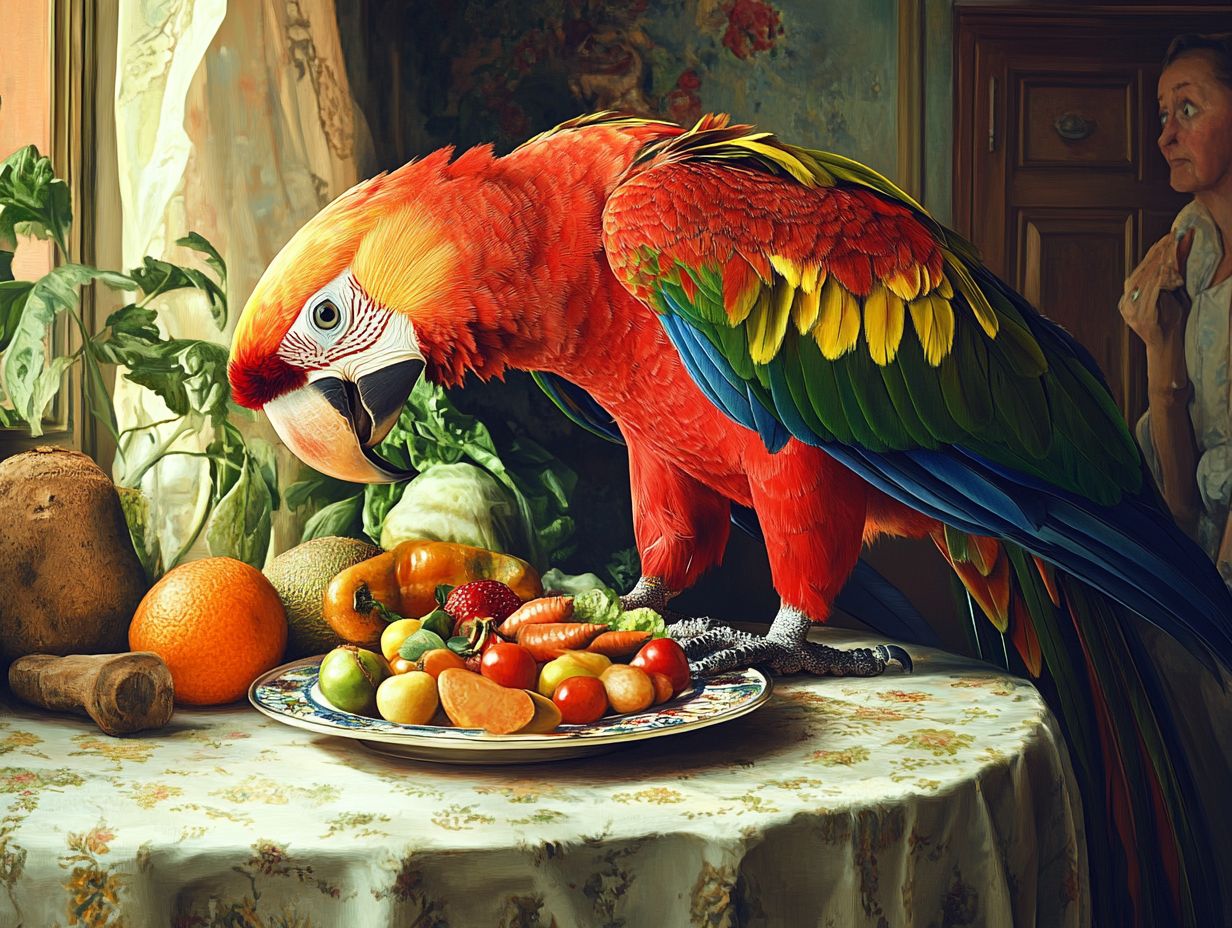
Certain foods pose a serious threat to parrots, including avocados, chocolate, onions, and garlic, all of which can lead to significant health complications if ingested. These ingredients contain harmful substances like persin (a toxin for birds), theobromine (found in chocolate), and sulfur compounds, which can disrupt a bird s sensitive system.
Symptoms of poisoning may manifest as lethargy, gastrointestinal distress, or even respiratory issues. As a responsible bird owner, you must watch what your bird eats.
Instead of offering these hazardous items, consider safer alternatives such as:
- Bell peppers
- Cooked sweet potatoes
- Leafy greens
These options deliver essential nutrients without the toxic risks. By ensuring a balanced diet free from these dangers, you can promote a healthy and vibrant life for your playful companion.
How to Introduce Human Food to Your Bird
Introducing human food to your parrot should be a gradual journey, enabling them to acclimate to new flavors and textures. This approach ensures that their overall diet remains balanced and nutritious, safeguarding their health while expanding their culinary horizons.
Balancing a Bird’s Diet with Human Foods
Balancing a parrot’s diet with suitable human foods requires careful planning. Ensure these additions complement their primary bird diet without overshadowing essential nutrients.
Incorporating fruits, vegetables, and whole grains into their meals can enhance their diet. These foods provide vital vitamins and minerals that regular feed might lack.
It’s important to introduce new foods gradually. This allows your parrot to adapt while you monitor for any bad reactions.
Moderation is crucial for a healthy diet. Even healthy human foods, when overindulged, can lead to bad eating habits, like obesity or digestive problems.
By offering a variety of options from leafy greens to small pieces of unsalted nuts you keep mealtime exciting. This variety ensures your parrot receives a broad spectrum of nutrients vital for their overall health.
Frequently Asked Questions
Can my bird eat human food?
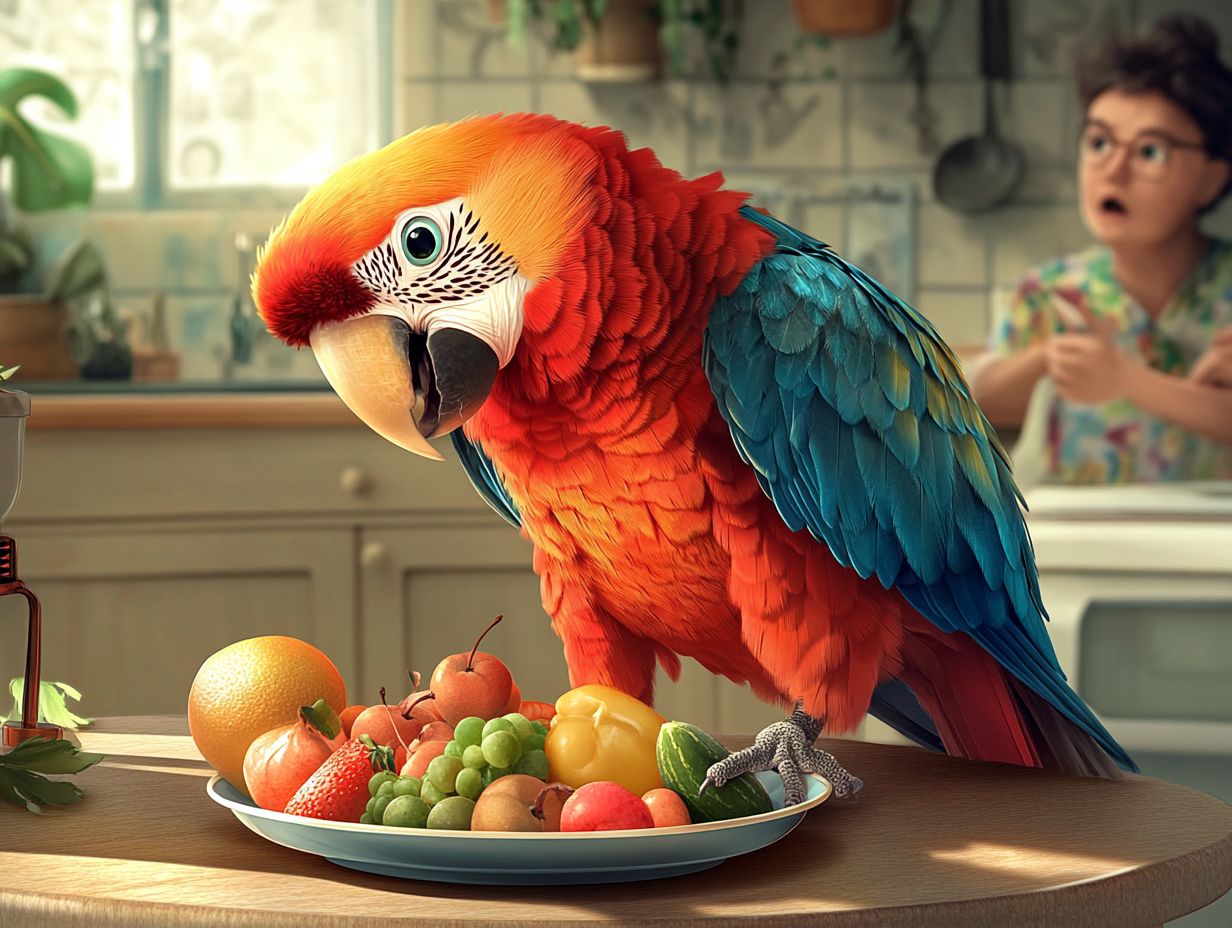
It all depends on the food! Some human foods are safe for birds, while others can be harmful.
Which human foods are safe for my bird to eat?
Safe options include cooked rice, fruits like apples, berries, and bananas, and vegetables such as carrots, cucumbers, and bell peppers.
Can my bird eat bread or grains?
Bread and grains are not recommended for birds. They do not provide proper nutrition and can lead to health issues.
Is it okay to give my bird dairy products?
No, dairy products are not suitable for birds. They can’t digest lactose.
Can my bird eat chocolate or other sweets?
No, chocolate and other sweets contain toxic ingredients for birds and should be avoided.
What should I do if my bird accidentally eats human food?
If your bird ingests a small amount of safe human food, monitor them for any changes in behavior or appetite. If they consume harmful food, contact your veterinarian immediately.

